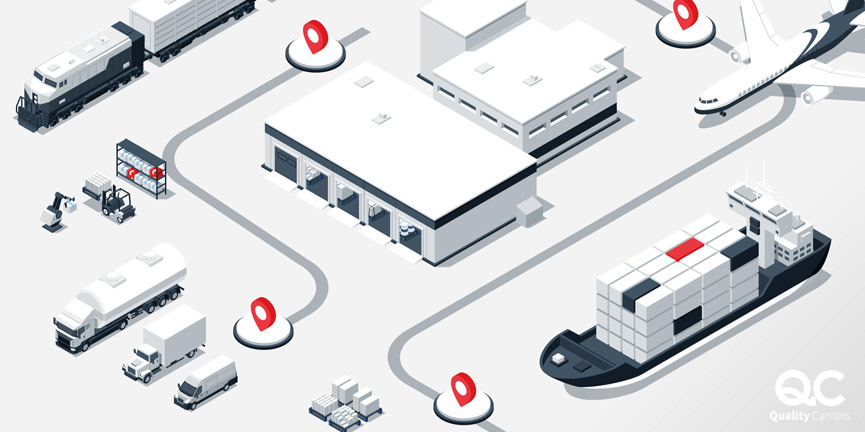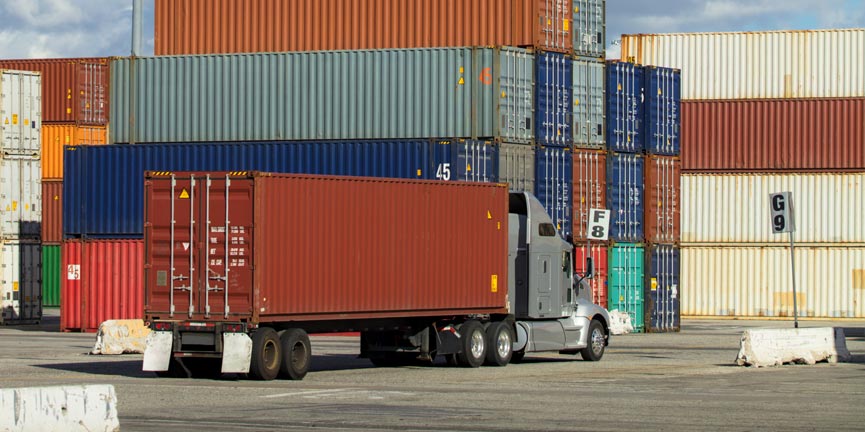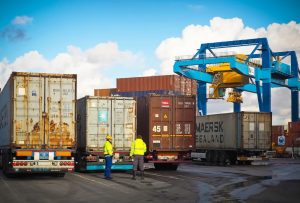In our modern transportation today, an “intermodal carrier” is more than just a term; it’s a force shaping the movement of goods across the globe. But what does this term signify, and how does it impact the intricate web of transportation systems? To understand an intermodal carrier, we must first unravel the intricacies of contemporary transportation.
Transportation is the lifeblood of our globalized society. The silent force ensures products, materials, and goods reach their intended destinations efficiently. However, the logistics behind transportation could be more complex. They involve a harmonious interplay of various modes—trucks, trains, ships, airplanes, and more. These modes must work together seamlessly to keep our world connected and businesses running. This is where the concept of an intermodal carrier enters the scene.

Defining Intermodal Carrier
An intermodal carrier is a company or service provider specializing in freight transportation using a combination of different modes of transportation within a single, integrated supply chain. These carriers can seamlessly transition cargo between various transportation options, such as trucks, trains, ships, and sometimes even airplanes, to find the most efficient and cost-effective route for shipping goods. Intermodal carriers play a crucial role in optimizing logistics, reducing costs, and ensuring the smooth movement of cargo in both domestic and international freight transportation.
These modes typically include:
Trucking: The backbone of intermodal transportation, trucking involves using trucks to transport cargo to and from various locations, including ports, rail yards, and distribution centers.
Rail: Rail transport offers an efficient and environmentally friendly means of moving large volumes of goods over long distances. Intermodal carriers often partner with railroads to transport containers and trailers on specially designed railcars.
Ocean: For international shipping, ocean carriers play a vital role. They transport goods in containers across oceans and seas, connecting different parts of the world.
Air: While less common in intermodal transport due to cost and speed considerations, air cargo intermodal services may be integrated into certain intermodal logistics chains, especially for high-value or time-sensitive goods.
How Intermodal Carriers Operate
Intermodal carriers operate by seamlessly integrating multiple modes of transportation, including trucks, trains, ships, and sometimes airplanes, to transport goods efficiently and cost-effectively. Here’s how intermodal carriers typically operate:
- Planning and Coordination: Intermodal carriers begin by planning the transportation route based on factors like the origin and destination of the cargo, the type of goods being shipped, and customer requirements. They coordinate the entire journey’s logistics, considering each transportation mode’s strengths and weaknesses.
- Initial Pickup: The process usually starts with a truck picking up the cargo from the shipper’s location or a designated distribution center. This is known as the initial or first-mile pickup.
- Transfer to Intermodal Terminal: The cargo will be transported by truck to an intermodal terminal or facility, prepared for transfer to another mode. This can include sorting, documentation, and ensuring the cargo is properly packaged and secured.
- Intermodal Transport: At the terminal, the cargo is loaded onto a different mode of transportation, often a train or a ship. Trains are commonly used for long-distance shipments due to their efficiency and capacity. For international shipments, cargo might be loaded onto ships or airplanes.
- Transfer Between Modes: During intermodal transportation, cargo may undergo multiple transfers between different modes. For example, a container might be moved from a truck to a train, then from a train to a ship, and so on. Specialized equipment like cranes and gantries are used for these transfers.
- Long-Distance Transit: The cargo travels the long-distance segment of the journey using the selected mode. Trains and ships are known for their fuel efficiency and ability to transport large volumes over extended distances.
- Final Delivery: Once the cargo reaches its destination, it’s unloaded from the long-distance mode, often at another intermodal terminal. From there, it’s transferred back to a truck for final delivery to the recipient, known as the last-mile delivery.
- Distribution: If needed, the cargo can undergo further distribution through regional or local transportation networks to reach its final destination.
- Tracking and Monitoring: Intermodal carriers employ advanced tracking and monitoring systems throughout the journey to maintain visibility and security. This ensures that the cargo arrives on schedule and in good condition.
- Documentation and Compliance: Intermodal carriers handle all necessary documentation, including customs clearance for international shipments. They ensure compliance with regulations and requirements specific to each transportation mode and destination.

The Advantages of Intermodal Transportation
Intermodal transportation, which seamlessly combines various modes of transportation like trucks, trains, ships, and airplanes, offers many advantages for businesses and the logistics industry. Here are the main benefits of intermodal transportation:
- Cost Efficiency: Intermodal transportation proves to be a more cost-efficient alternative compared to depending exclusively on a single mode of transportation. It allows companies to select the most cost-efficient methods for different legs of the journey, reducing overall transportation expenses.
- Environmental Sustainability: By utilizing modes like trains and ships, which are more fuel-efficient per ton-mile than trucks, intermodal transportation helps lower greenhouse gas emissions and reduce the environmental impact of freight shipping. This makes it an eco-friendly choice for long-distance transport.
- Reliability: Intermodal transportation offers redundancy in the supply chain. If one mode faces disruptions or delays, goods can be easily transferred to another mode, ensuring that shipments arrive on time and reducing the risks associated with single-mode transportation.
- Flexibility: Intermodal carriers have the flexibility to choose the most reliable or fastest route for each shipment. This adaptability allows them to meet customer demands and handle unexpected challenges effectively.
- Global Reach: Intermodal transportation facilitates global trade by connecting various transportation networks. It enables the transfer of goods across borders, supporting international commerce and supply chain globalization.
In conclusion, intermodal carriers are the linchpin of modern logistics, seamlessly integrating different transportation modes to ensure goods are delivered efficiently and cost-effectively. As global trade continues to expand, the role of intermodal carriers in the supply chain is more critical than ever, making them indispensable players in the world of transportation and commerce.
FAQs about Intermodal Carriers
Intermodal carriers can transport a wide range of cargo, including consumer goods, industrial materials, electronics, and even perishable items. They are known for their versatility in handling various types of freight.
While intermodal transportation is often used for long-distance shipping due to its cost-efficiency, it can also be employed for shorter hauls. The choice depends on distance, cargo volume, and timing requirements.
Intermodal carriers employ secure containers and trailers designed to protect cargo during transfers. Additionally, they use tracking and monitoring systems to maintain visibility and security throughout the journey.









